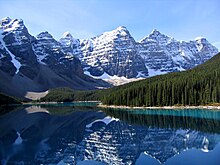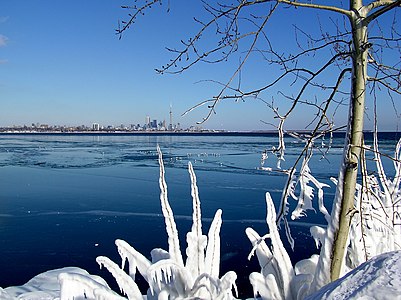Portal:Canada
| Showcase | Content | Contributing |
Introduction
Canada is a country in North America. Its ten provinces and three territories extend from the Atlantic Ocean to the Pacific Ocean and northward into the Arctic Ocean, making it the world's second-largest country by total area, with the world's longest coastline. Its border with the United States is the world's longest international land border. The country is characterized by a wide range of both meteorologic and geological regions. It is a sparsely inhabited country of 40 million people, the vast majority residing south of the 55th parallel in urban areas. Canada's capital is Ottawa and its three largest metropolitan areas are Toronto, Montreal, and Vancouver.
Canada is a parliamentary democracy and a constitutional monarchy in the Westminster tradition. The country's head of government is the prime minister, who holds office by virtue of their ability to command the confidence of the elected House of Commons and is "called upon" by the governor general, representing the monarch of Canada, the ceremonial head of state. The country is a Commonwealth realm and is officially bilingual (English and French) in the federal jurisdiction. It is very highly ranked in international measurements of government transparency, quality of life, economic competitiveness, innovation, education and gender equality. It is one of the world's most ethnically diverse and multicultural nations, the product of large-scale immigration. Canada's long and complex relationship with the United States has had a significant impact on its history, economy, and culture.
A developed country, Canada has a high nominal per capita income globally and its advanced economy ranks among the largest in the world, relying chiefly upon its abundant natural resources and well-developed international trade networks. It is recognized as a middle power for its role in international affairs, with a tendency to pursue multilateral and international solutions. Canada's peacekeeping role during the 20th century has had a significant influence on its global image. Canada is part of multiple international organizations and forums. (Full article...)
Featured article -
Banff National Park is Canada's oldest national park, established in 1885 as Rocky Mountains Park. Located in Alberta's Rocky Mountains, 110–180 kilometres (68–112 mi) west of Calgary, Banff encompasses 6,641 square kilometres (2,564 sq mi) of mountainous terrain, with many glaciers and ice fields, dense coniferous forest, and alpine landscapes. Provincial forests and Yoho National Park are neighbours to the west, while Kootenay National Park is located to the south and Kananaskis Country to the southeast. The main commercial centre of the park is the town of Banff, in the Bow River valley. (Full article...)
Featured biography -
Major-General Sir Isaac Brock KB (6 October 1769 – 13 October 1812) was a British Army officer and colonial administrator from Guernsey. Brock was assigned to Lower Canada in 1802. Despite facing desertions and near-mutinies, he commanded his regiment in Upper Canada (part of present-day Ontario) successfully for many years. He was promoted to major general, and became responsible for defending Upper Canada against the United States. While many in Canada and Britain believed war could be averted, Brock began to ready the army and militia for what was to come. When the War of 1812 broke out, the populace was prepared, and quick victories at Fort Mackinac and Detroit defeated American invasion efforts. (Full article...)
Selected panorama -
National symbol -

The National Flag of Canada (French: Drapeau national du Canada), often simply referred to as the Canadian flag or, unofficially, as the maple leaf flag or l'Unifolié (French: [l‿ynifɔlje]; lit. 'the one-leafed'), consists of a red field with a white square at its centre in the ratio of 1∶2∶1, in which is featured a stylized, red, 11-pointed maple leaf charged in the centre. It is the first flag to have been adopted by both houses of Parliament and officially proclaimed by the Canadian monarch as the country's official national flag. The flag has become the predominant and most recognizable national symbol of Canada. (Full article...)
Selected vital article -
The culture of Canada embodies the artistic, culinary, literary, humour, musical, political and social elements that are representative of Canadians. Throughout Canada's history, its culture has been influenced firstly by its indigenous cultures, and later by European culture and traditions, mostly by the British and French. Over time, elements of the cultures of Canada's immigrant populations have become incorporated to form a Canadian cultural mosaic. Certain segments of Canada's population have, to varying extents, also been influenced by American culture due to shared language (in English-speaking Canada), significant media penetration and geographic proximity. (Full article...)
Selected picture -
Current events
- April 12, 2024 – War in Sudan
- Canada pledges $132.2 million dollars to Sudan to help people affected by the country's ongoing humanitarian crisis. (Global News)
- April 1, 2024 – Israel–Hamas war
- Seven volunteers from the World Central Kitchen, including six British, Polish, Australian and Palestinian nationals and a dual American-Canadian citizen, are killed in an Israeli airstrike south of Deir el-Balah. (Al Jazeera)
- March 31, 2024 – Haitian crisis
- Canada deploys 70 members of its armed forces to Jamaica to train peacekeepers for a future intervention in Haiti. (CBC News)
- March 9, 2024 – Israel–Hamas war
- Canada and Sweden resume funding for UNRWA, which had been suspended following the UNRWA October 7 controversy. (BBC News)
- March 6, 2024 – Killing of the Wickramasinghe family
- A Sri Lankan family, of four children and their mother, are killed with the father injured in a mass stabbing at a residence in the suburb of Barrhaven, in Ottawa, Canada. A young man is arrested. (CBOT-DT)
- February 28, 2024 –
- The Canadian government releases its report into the high-profile firings of two scientists from the National Microbiology Laboratory in Winnipeg, Manitoba, in 2021, stating that the pair worked closely and covertly with the Chinese government. (National Post)
Did you know -

- ... that the Canadian government implemented the Peasant Farm Policy to force First Nations farmers to use the methods of European peasants?
- ... that White Lake Provincial Park is the only provincial park in Ontario, Canada, with an exceptional provision allowing hydroelectric activity as a non-conforming use?
- ... that Hope Muir was hired as the artistic director of the National Ballet of Canada without any in-person interviews?
- ... that the Canadian rock band Rainbow Butt Monkeys changed their name to "Finger Eleven" before releasing their second album Tip?
- ... that archaeologists found evidence at Michipicoten Provincial Park on the north shore of Canada's Lake Superior that indigenous people used the site since at least 1100 AD?
- ... that Edwin Atwater and his brother were the first people to import glass into Canada?
- ... that Amanda Asay was the longest-serving member of the Canadian women's baseball team when she died at 33, having played on the team for sixteen years?
Featured list -
Canada is a federation that comprises ten provinces and three territories. Its government is structured as a constitutional monarchy and a parliamentary democracy, with a monarch as its sovereign and a Prime Minister as its head of government. Each of the country's provinces and territories also has a head of government, called premier in English. Collectively, the federal Prime Minister and provincial and territorial premiers are referred to as first ministers. In French, the term premier ministre is used in both the federal and provincial/territorial contexts. (Full article...)
Main articles
Associated Wikimedia
The following Wikimedia Foundation sister projects provide more on this subject:
-
Commons
Free media repository -
Wikibooks
Free textbooks and manuals -
Wikidata
Free knowledge base -
Wikinews
Free-content news -
Wikiquote
Collection of quotations -
Wikisource
Free-content library -
Wikiversity
Free learning tools -
Wikivoyage
Free travel guide -
Wiktionary
Dictionary and thesaurus































